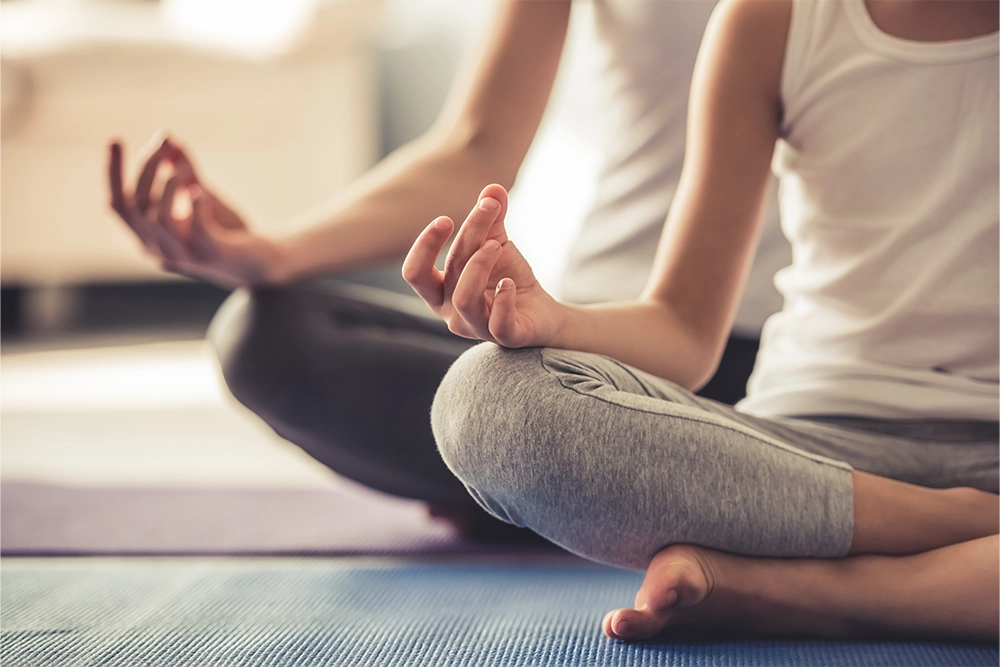There are many ways to address drug and alcohol addiction. It is first important to see an addiction treatment specialist or go to a rehab centre so that health care professionals will be able to assess your condition and provide the necessary care and assistance. During your addiction recovery, you’ll be introduced to several treatment types. The kind of treatment that you’ll have depends on many factors such as the substance you were using, the length of time that you’ve been using it, and so on. Alternative treatments such as yoga, exercise, and meditation may also be introduced. In this article, we will focus on answering the question “can meditation help in addiction recovery?” Let’s find out!
Understanding What Meditation Is
Meditation is an ancient practice which is utilized to boost comfort, enlightenment, and spiritual relationship. While sitting at a silent or calm location, meditation entails focusing on a specific thought or idea. Meditation may be done alone or in groups.
There are many kinds of meditation and various ways that it can be done. During a meditation session, you will be able to have careful consideration and thought of your feelings, ideas, and experiences.
Generally, meditation is a kind of exercise where you will focus on the connection of your mind and body. The point of this exercise is to induce serenity and relaxation. There have been studies that looked into the effects of meditation and found that it can indeed improve both mental and physical health.
The way meditation is practiced is greatly varied. However, there are a number of guidelines or components that are common on all of those meditation types. This includes finding a place that is quiet and free from distractions, sitting or lying comfortably, focusing on your breathing, and keeping an open mind.
There’s no fixed time for a meditation session. For beginners, the session may last for only a few minutes. They can then work on adding more time eventually. Meditation is not only for the religious or spiritual. It is not a requirement for you to exercise meditation.
What you have to keep in mind is that the focus of meditation is mindfulness or being aware of your surroundings, physical sensations, thoughts, and feelings at present. Mindfulness is also about being able to accept your thoughts and feelings without you having to label them. Just take them as they are.
While meditation and other alternative treatments for addiction are met with a certain level of skepticism by others, there is a growing number of studies supporting its effectiveness for helping people who want to recover from drug and alcohol addiction as well as prevent relapse.
What are the Benefits of Meditating Regularly?
More and more people are practicing meditation exercises because of its many benefits. With meditation, you develop the habit of training the mind to be more focused. When this is achieved, then you can be more aware of yourself as well as your surroundings. It can be a way of reducing stress and also developing concentration.
People who do meditation exercises practice it so they can develop other habits that may be beneficial for their life. This includes better sleeping patterns, self-discipline, and a more positive outlook and mood. Let’s take a look at the other benefits of meditating regularly.
Stress Management through Meditation
Meditation is when you focus your attention on a single thing while discarding all other ideas. Frequently, focusing on just one matter can be quite difficult. This sort of focus is also valuable in picking out what ideas to consider, in addition to having an insight into your patterns of thought or thinking.
The main function and advantage of meditation are that it empowers the individual to remain focused inside of this particular moment. Most of the time, we become too wrapped up in ideas, anxieties, and worries simply by being stuck thinking over how a lot of things ought to happen or even replay the past on what we may have done.
In spending a lot of our energy and time thinking of the near future or the past, what happens is we lose precious moments of our present life. We overlook the important things and become lost in our many thoughts. We spend hours worrying about the things which may never happen. We remain mad over something that has already happened many years back and doesn’t have a bearing on the life we have now. Because of this way of thinking, we spend much less time focusing on these things that are truly significant in our own lives at present.
The advantages of meditation would be the reduction of fatigue and strain. However, stress reduction’s benefits go much beyond just feeling concentrated and much more relaxed. It has also been proven to have a potential influence on the individual’s health. By lowering oxygen consumption and blood lactate levels, diminishing heart and respiration rates, and diminishing other outcomes of anxiety, meditation can help you in attaining overall wellness.
Meditation as a Remedy for Insomnia
If sleeplessness is in the root of your exhaustion during the day and the many sleepless nights, then it can be worth attempting meditation. The profound relaxation technique was demonstrated to improve sleeping time, improve sleep quality, and also make it a lot easier to sleep and remain asleep.
These are a few fundamental facts about meditation that might help you get over any hesitation about trying it. Meditation can be a terrific tool for individuals looking for a natural, medicine-free method to deal with insomnia.
In reality, meditation has been proven to reduce the usage of sleeping pills. By decreasing measures of stimulation, insomnia symptoms improved. And there are no side effects or no risks to attempting meditation.
It may be utilized with other sleeping methods. Mixing cognitive-behavioural treatment for insomnia with mindfulness meditation was shown to enhance sleep greater than CBT alone. There are several other health benefits; meditation doesn’t just enhance your sleep quality, but it might also decrease blood pressure and alleviate pain, nervousness, and depression.
Meditation is also a very doable, budget-friendly practice which every person can attempt. Start by finding a place that is comfortable to sit or lie down, then close your eyes and breathe deeply and slowly, directing your attention to your breath as you exhale and inhale. Just bring your attention back to your breath if your mind begins to drift. Since you become more comfortable with your meditation sessions, you may try doing this for maybe five minutes at a time.
Related article: How Mindfulness Meditation for Drug Recovery Helps in Treating Drug Addiction
Treating Depression with Meditation
The signs of depression vary from one individual to another. But if you have been feeling “blue” for many weeks, cannot really summon the energy required to handle the world, and discover that your emotions are disrupting your regular way of life, you might be suffering from clinical depression. We advise you to seek out medical assistance if these symptoms seem familiar. In the meantime, you may also try meditation if it will work for you.
First off, how does our general wellness be affected by meditation? Meditation makes us become more conscious of what is happening inside ourselves. Additionally, it lets us gain insight into the feelings which that may surface such as craving, anxiety, stress, and anger.
You will find so many reasons to be anxious and depressed about in the world that may convince us to eliminate being in touch with our feelings and our emotions. We might wind up suppressing them if we do not listen to them and it is never healthy. Meditation connects us back to those feelings.
The consciousness – psychological, emotional, and spiritual – which meditators reach helps them identify the signs of tension, stress, and depression. This makes it a lot easier to cope with and handle these problems before they snowball.
You can learn how to comprehend your emotions and thoughts without censoring or judging them. This space from emotions that are damaging enables meditators to discover resources they might not have been conscious of. These are tools which inform you of your own life and make it much easier to concentrate on your well-being.
Meditation for Addiction Recovery
Among the initial actions in the management of addiction would be to discover its cause. Maybe it’s nervousness, depression, anxiety, or pessimism. Many times these unwholesome ideas and beliefs come out of what are “wanting thoughts.”
In this way of thinking, we believe that our condition of unhappiness could be treated if we might have the cash, occupation, relationship, power, and other things we desire and had and lost, or not needed.
We cause ourselves distress if we ache for something which lies from our grasp or cling to something which is already not with us anymore. This mentality entails a belief about the way things need to be.
That’s why we find ourselves closely holding on to something negative like emotions such as jealousy, despair, or anger. Practice helps us end our suffering and build the capability to see that we are able to let go of what we are negatively connected to.
Meditation is successful in treating substance addiction or dependency as it rewires the mind’s crucial pathways. What exactly does this have to do with drug or alcohol addiction? We all have a tendency to make decisions that are unwise in addition to reacting to different scenarios without giving it much thought.
Meditation may be helpful in managing drug cravings and will help to alleviate some of the strain. Many individuals who practice meditation discover they are much better able to control their feelings and are more conscious of the ideas troubled by unpleasant encounters.
Making the option to become sober and clean is not straightforward. The notion of living without drugs or alcohol can be frightening if you’re unsure what life will be like on the opposite side. The reality is, life is not agreeable or carefree but we have to strive to live a good life.
Meditation will help you to discover what’s the root cause of your substance use. It may be tough to confront the bad thoughts and feelings that have been pushing you to continue your bad habits but it’s the first step to heal and overcome your addiction. Here are the steps to practice mindfulness. Don’t worry; it’s doable and easy.
Steps to Practice Mindfulness
There is an infinite number of ways to become mindful throughout the time you’re recovering from addiction and even after that. Here, we’ll cover a straightforward eight-step procedure for practicing mindfulness.
- Dedicate distance and time for your mindfulness session.
The space for your session should ideally be silent, calm, and relaxing. You will need to choose a time during the day to do this. Create a place in your home that lets you just relax while practicing mindfulness and is calming. Besides meditating do not use this space for anything. In this manner, when you sit, your body will be advised that it’s time exercise mindfulness and to relax.
- Make a conscious attempt to concentrate on the current moment.
Should you stop to consider it, the single moment where you’re able to reside in is your gift. Do not consider the past or the future, and completely accept yourself. Always return to listening to the sound you can hear around you and make the effort to focus on your breath.
- Permit yourself to just be and simply to do nothing.
You don’t necessarily need to be busy in order to get things accomplished. You can be productive once you do need to get the job done but your body and mind should recharge. Allow yourself time to just be and do nothing but live in the moment, at least for a few moments.
- Do not consider the past. Do not plan the long run. Do not examine the moment.
You know you can not alter the past. Quit thinking. The future isn’t here yet, therefore there’s not any requirement to focus closely on this. The near future will come to you. Focus on the present moment without worrying.
- Pay attention to words, your ideas, actions, and motives.
Whenever you’re thinking, saying, or doing something, what’s the reason for it? Consider the motives behind all you do. Be certain you are constantly coming from a place that is good when you decide to talk or behave at all.
- Notice how you cast judgments and allow them to pass.
It’s ok to have your own judgments. This is a thing that everybody encounters. It is very important to admit them and permit them to pass as thoughts. Judgments aren’t permanent, and your way of thinking can change, and thus, don’t get involved too involved with your judgments on things or people.
- Return to the moment.
Should you start to feel apprehensive about the future or regretful about the past, return your focus to the moment available. Realize that there’s not anything you can do to change the past or do anything which could be coming later on to you. Go back to the here and now to reside in peace.
- If your mind begins to wander during your mindfulness session, do not be too hard on yourself. Bring your focus back to the present. Everybody’s mind will ramble now and then while they’re practicing mindfulness meditation. It’s ok to let it go and to comprehend your idea. Take some deep breaths When it’s gone and then reset your attention to maintain your practice of mindfulness.
Final Thoughts
So, can meditation help in addiction recovery? We definitely think so. When combined with the right treatments from the best rehab centre, meditation can make the process of drug recovery easier. It does not only address the drug addiction but the individuals practicing it will be able to cultivate a healthier way of thinking.
If you are thinking of getting help to combat your drug or alcohol use, know that there will always be people who will be more than happy and ready to help you out. You have your family and friends who will cheer you on as you enter the recovery process. You may have strained some relationships along the way but if you can prove to them that you are willing to change, that’s already a big step towards healing.
Also, trained medical professionals in the best rehab centre will make sure that you will have every opportunity to address the addiction. This may mean giving you support, encouragement, and affirmation that you are doing great. It may not be easy all the time as withdrawal and other symptoms are things you have to deal with. Nevertheless, you will be provided with all avenues to push through with your recovery.
If you’re tired of a life of being dependent on a substance, then know that it’s never too late to ask for help and enter a recovery program. People will help you along the way but you have to make the decision yourself that you want to change for the better.
Related article: Gardening Therapy for Addiction Recovery








